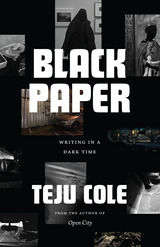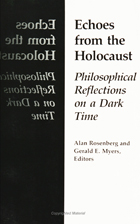
“Darkness is not empty,” writes Teju Cole in Black Paper, a book that meditates on what it means to sustain our humanity—and witness the humanity of others—in a time of darkness. One of the most celebrated essayists of his generation, Cole here plays variations on the essay form, modeling ways to attend to experience—not just to take in but to think critically about what we sense and what we don’t.
Wide-ranging but thematically unified, the essays address ethical questions about what it means to be human and what it means to bear witness, recognizing how our individual present is informed by a collective past. Cole’s writings in Black Paper approach the fractured moment of our history through a constellation of interrelated concerns: confrontation with unsettling art, elegies both public and private, the defense of writing in a time of political upheaval, the role of the color black in the visual arts, the use of shadow in photography, and the links between literature and activism. Throughout, Cole gives us intriguing new ways of thinking about blackness and its numerous connotations. As he describes the carbon-copy process in his epilogue: “Writing on the top white sheet would transfer the carbon from the black paper onto the bottom white sheet. Black transported the meaning.”

The murder of six million Jewish men, women, and children during World War II was an act of such barbarity as to constitute one of the central events of our time; yet a list of the major concerns of professional philosophers since 1945 would exclude the Holocaust. This collection of twenty-three essays, most of which were written expressly for this volume, is the first book to focus comprehensively on the profound issues and philosophical significance of the Holocaust.
The essays, written for general as well as professional readers, convey an extraordinary range of factual information and philosophical reflection in seeking to identify the haunting meanings of the Holocaust. Among the questions addressed are: How should philosophy approach the Holocaust? What part did the philosophical climate play in allowing Hitlerism its temporary triumph? What is the philosophical climate today and what are its probable cultural effects? Can philosophy help our culture to become a bulwark against future agents of evil? The multiple dimensions of the Holocaust—historical, sociological, psychological, religious, moral, and literary—are collected here for concentrated philosophical interpretations.

In a Dark Time is an anthology for the nuclear age, created by two professional psychologists who have ordered their material so that the successive selections reflect and comment on one another, compelling the reader to think about the insanity of war. This book draws on thoughts and writings from more than two millennia: poets from Sappho to Robert Lowell, dreamers from Saint John the Divine to Martin Luther King, Jr., statesmen from Seneca to Winston Churchill, soldiers, churchmen, writers, leaders. Along with them are mingled the voices of people who have faced appalling danger in their own lifetimes--an American schoolchild, a Hiroshima grocer, a plague survivor, a Turkish dissident. Human beings appear at their best and at their worst: as savage warriors, as helpless victims, as dupes of "Nukespeak" and warlike propaganda, and finally as individuals with the courage to say no.
In a Dark Time will shock, warn, and ultimately inspire those many people who share the perception that humankind now stands on the brink of self-annihilation but who believe, with Theodore Roethke, that "in a dark time, the eye begins to see."
READERS
Browse our collection.
PUBLISHERS
See BiblioVault's publisher services.
STUDENT SERVICES
Files for college accessibility offices.
UChicago Accessibility Resources
home | accessibility | search | about | contact us
BiblioVault ® 2001 - 2024
The University of Chicago Press









